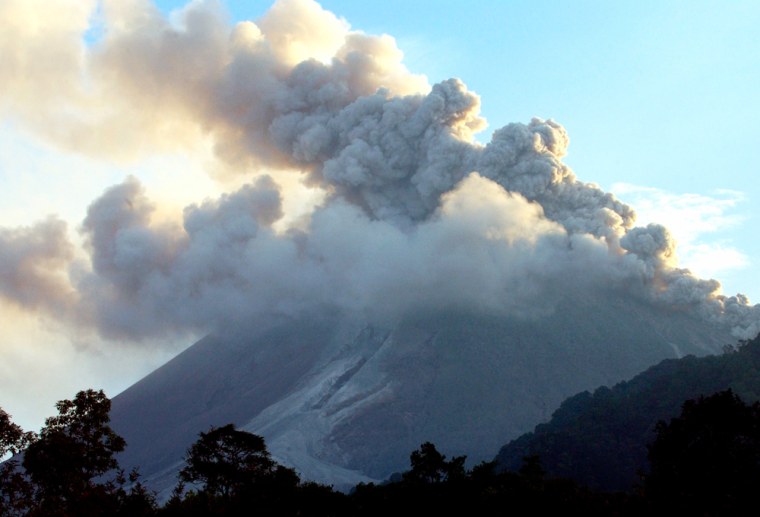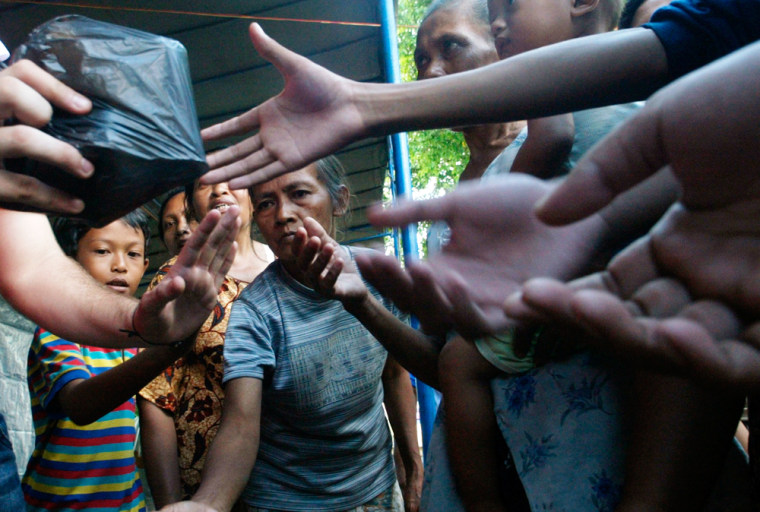The Mount Merapi volcano spewed lava and hot clouds Saturday and a strong aftershock hit the region, sending fear rippling through the southern Indonesian area devastated by an earthquake only a week ago.
The mountain’s lava dome has swelled in the past week to 330 feet, raising fears that it could collapse, said Subandriyo, a government scientist who uses one name. That could release a highly dangerous pyroclastic flow—a fast-moving burst of high-temperature gases and rock fragments that burns anything in its path.
More than a thousand aftershocks have hit the region since the 6.3-magnitude earthquake struck before dawn May 27, killing at least 6,234 people and injuring 30,000 more. Officials estimate that 135,000 homes were destroyed.
Scientists say the quake may have contributed to a weakening of the lava dome.
Most aftershocks have been weak, but one overnight Saturday jolted survivors awake.
“I picked up my nephew and ran out of the house. It was very strong,” said Yudi, who like many Indonesians uses one name. There were no reports of damage from the quake, measured at magnitude 3.4.
Worried villagers in recent days have performed rituals aimed at warding off an eruption. On Thursday, the mountain’s royally appointed spiritual guardian, “Mbah” Maridjan, led a silent procession of 100 people three times around a village near the volcano.
Most of the estimated 647,000 people left homeless are living in makeshift shelters—often just plastic tarps to ward off tropical downpours and the hot sun—with no toilets or running water.

Thirty more U.S. military medical personnel arrived Saturday, and were followed by a 135-member medical team from Cuba with two field hospitals. Medical teams already have arrived from Singapore, Japan, Iraq, Malaysia, Qatar and Pakistan.
The United Nations issued an urgent appeal Friday for $103 million to pay for the recovery effort over the next six months—with about half of that for rebuilding homes. Aid workers have yet to reach some remote areas, and delivery of food, medicine and tents has been sporadic in others.
More than 50 people were staying Saturday in two large empty chicken coops in Pentong in Bantul district. Flies buzzed everywhere, and children played barefoot on bamboo slats encrusted with chicken droppings.
The British medical aid agency Merlin said it was concerned that the villagers could catch bird flu or salmonella, and it appealed for more tents for survivors.
Bird flu cases have rocketed in Indonesia in the past month, with some occurring in districts surrounding the quake zone. At least 38 Indonesians have died.
Parji, the 60-year-old owner of one of the coops, told The Associated Press that he was not afraid of bird flu.
“There is a slight smell from the dung, but I look after the health of my birds. I am certain there is no bird flu here,” he said.
Two earthquake survivors committed suicide Friday, one by hanging and the other by jumping down a well, Bantul police chief Lt. Col. Dedy Munazat said. Both men had lost their homes in the quake.
Government officials said 380 people who had complained of dizziness and severe stomach pains after eating donated food Thursday were apparently suffering from post-trauma stress. The villagers were treated at four hospitals and laboratory tests found the food was safe, the national disaster agency said.
The massive relief effort comes as Indonesia is still trying to rebuild from the 2004 tsunami, which killed 131,000 people in western Aceh province alone.
